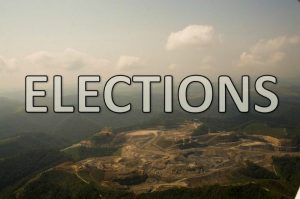Front Porch Blog
Part 3 in a 5 part series

Lie 3 of 5: No candidate opposed to mountaintop removal has ever been elected to the U.S. Senate, or ever will be.
3. A candidate opposed to mountaintop removal cannot win a U.S. Senate race in Kentucky or West Virginia.
Despite what political supporters of the coal industry would have us believe, a candidate opposed to mountaintop removal coal mining can, and likely will, represent Kentucky or West Virginia in the U.S. Senate someday.
While it it has not happened yet, the past does not dictate the future. A woman has never been elected to the Senate in either state, but looking ahead to the 2014 elections, it seems likely that three of the four candidates — Natalie Tennant (D-WV), Shelley Moore-Capito (R-WV), and Alison Lundgren-Grimes (D-KY) — will be women. The primaries won’t happen until next year, but these women are the apparent front runners for their party nominations. It’s a pretty good bet that a woman will represent at least one of the two states in the Senate.
You may be thinking: “It’s about time. After all, more women serve in the Senate now than at any other time in history. But things will really have to change to put someone opposed to mountaintop removal in office.” Not according to a 2011 poll by Lake Research Partners and Bellwether Research, which found that in both Kentucky and West Virginia, voters had an unfavorable view of the mining practice.

A 2011 poll of likely voters in Kentucky and West Virginia found that significantly more voters have an unfavorable view of mountaintop removal than those with a favorable view.
Earlier this year, the political rags and rumor mill of Washington, D.C., went nuts over the prospect of Ashley Judd, an actress and one of the University of Kentucky’s favorite alumnae, running against Mitch McConnell for his Senate seat. Her biggest obstacle, in the view of many in the media, was that she is vehemently opposed to, outspoken and on-the-record against mountaintop removal mining in eastern Kentucky. Could she possibly win while going up against the coal industry?
After Judd declined to run for the seat, a recording of a McConnell campaign meeting was released in which GOP consultants laid out the attacks that could be most effective in beating Judd. They made it clear that they would want to highlight her opposition to coal-fired power plant pollution and support for cap and trade. Her opposition to mountaintop removal however, not so much:
“I’ve omitted all of her mountaintop removal stuff. It’s a whole separate category. It doesn’t quite test as well.” – GOP Consultant
Mountaintop removal is the ugly face of coal, and politicians generally try to avoid it whenever possible. They know what the polls say, and they know that their constituents do not like their leaders to stand by while their home states are destroyed.
Candidates and current Senators prefer to talk about the nefarious U.S. Environmental Protection Agency and Obama’s so-called “war on coal,” but they avoid the term “mountaintop removal.” They want the EPA to issue permits for valley fills, but are not so eager to admit that they support the dumping of mining waste into streams and oppose any efforts to limit the resulting water pollution.
Politicians are trying to carefully walk the line between supporting the coal industry and willfully advocating for the ongoing environmental catastrophe that is mountaintop removal coal mining.
It should not be so difficult to imagine a candidate being successful by opposing the unpopular destruction of the Appalachian mountains. One does not need to oppose coal or coal miners to see that the health impacts of air and water pollution outweigh the need for companies to mine coal in the cheapest way possible. There can be a candidate who understands the need to create change in the region, and also has the ability to communicate that need to the majority of Kentuckians and West Virginians.
An anti-mountaintop removal candidate from a major party may not emerge in 2014, but that is not because one could not win. Such a candidate will take the stage soon though, and we should all take them seriously.
LIE 1: BALANCE
LIE 2: ECONOMY
>> LIE 3: ELECTIONS
PREVIOUS
NEXT
Related News

Leave a comment
Your email address will not be published. Required fields are marked *

Great work. It is good to see that the totters of WV & K are finding that mountain top removal is just not a good practice. We need to help them see alternitives for employment, tax revenue, & a higher standard of living.
We must stop mountain top removal & get to reduce our country’s use of coal for electricity.